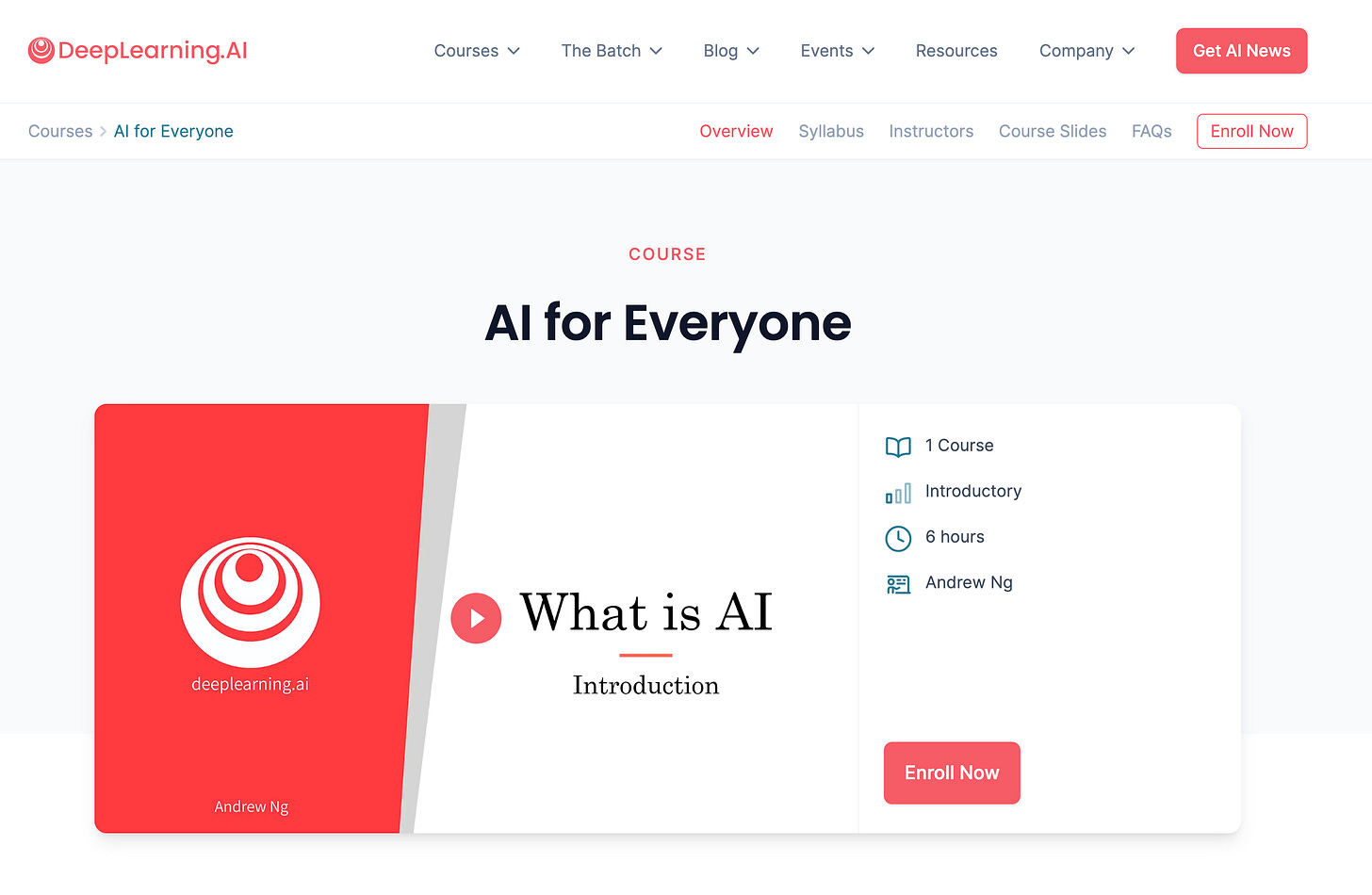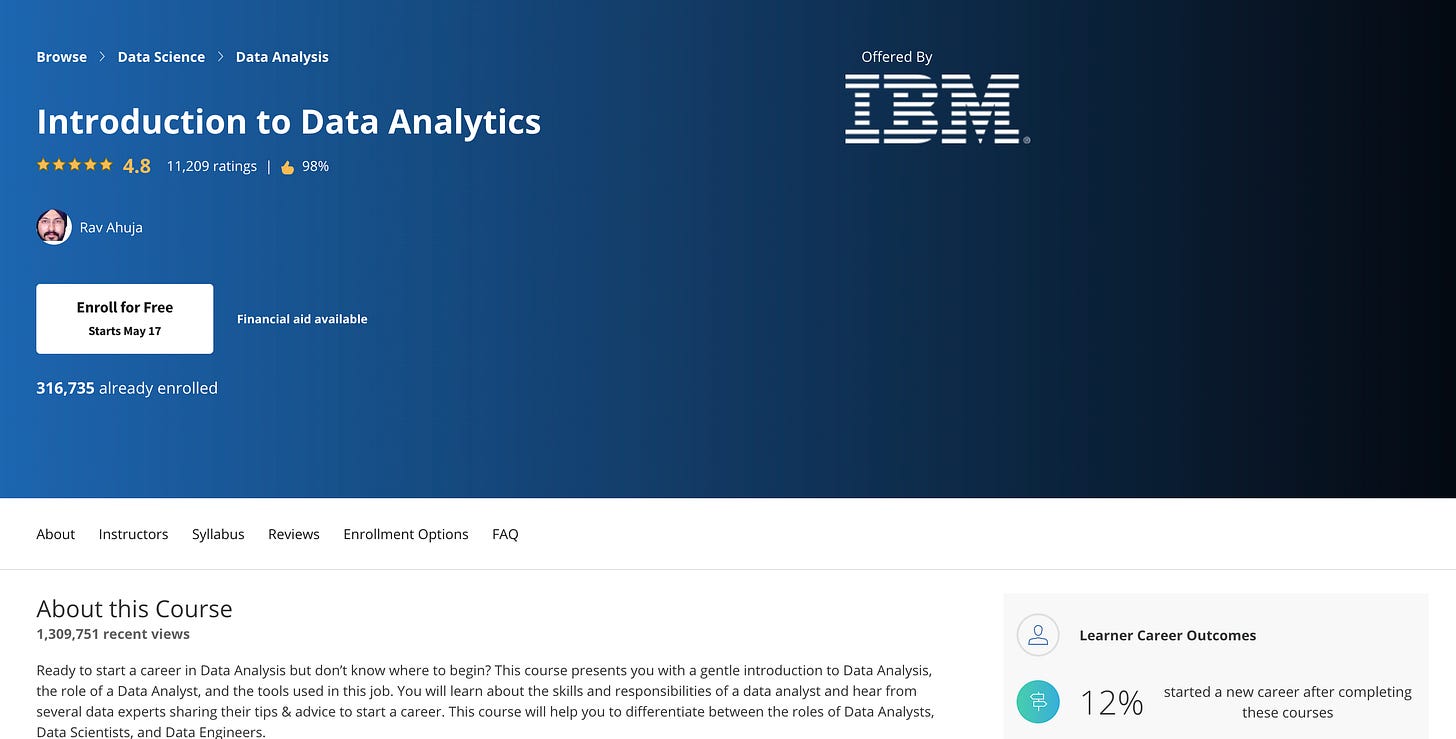The Post-AI Educator
Predictions on how AI will impact your role & practical steps to get AI-ready today.
A report published last week examined how the rise of generative AI might impact different occupations and demographics. The report found that out of the top 25 roles which will be most impacted by AI, 18 (72%) are educator roles.
As the initial panic over the use of AI in higher education starts to settle into a combination of curiosity and confusion, one of the questions I’ve been asked most in recent week is: what will the rise of AI mean for the role of the educator?
Here are my predictions, along with the three most powerful things that you can do today to future-proofing your skills.
Let’s go!
🚀
Introduction to Machine Learning for Educators
In their research, Felten, Raj and Seamans found that the occupations most likely to impact by AI are those which rely heavily on text-based language and communication, e.g. telemarketing and education. Why is this?
Language Learning Models (LLMs) like GPT-4 are a type of machine learning model that are trained to predict what comes next in a sequence of text. LLMs are trained on large amounts of text data and, using that data, learn to identify patterns in the way words and sentences are structured.
Here's a simple explanation of how they work:
Imagine you’re reading a book, but a few pages are missing. Based on what you've read so far, you could probably guess what happens next in the story, right? This is similar to what LLMs do, but at a much larger scale and in a more advanced way.
Tools like GPT-3 & 4 are fed lots and lots of text (books, articles, webpages etc.) and then use this data to learn the 'rules' of language - things like "an adjective often comes before a noun in English" or "a sentence usually ends with a period". Over time, GPT-4 starts to understand more complex patterns and can generate text that closely resembles human writing.
Suppose you give GPT-3 or 4 the following text: "The cat sat on the..."
Given this input, AI will predict what comes next based on the patterns it has learned from the data it was trained on. It might complete the sentence as, "The cat sat on the mat." It's able to do this because it has seen similar sentences in the data it was trained on and has learned that "mat" is a word that often follows the phrase "The cat sat on the..."
It's important to note, however, that while GPT-3 & 4 can generate text that seems remarkably human-like, it doesn't truly understand the text in the way humans do. It's essentially a very advanced pattern-matching tool, and its responses are generated based on statistical patterns it has learned, rather than any true understanding or consciousness. This is why prompt engineering and response validation is so important.
The Impact of Machine Learning on Educators
So what does all of this mean for educators?
As a heavily text-based profession, AI (specifically, LLMs) will significantly change education and our roles as educators. Indeed, change is already underway:
✔️ Automation of Administrative Tasks
LLMs are already assisting educators to automate tasks like grading and giving feedback. LLMs will soon be able to provide reliable feedback on more subjective assignments like essays, based on training from large datasets of already-graded essays and model answers. The ability to deliver personalised, targeted qualitative feedback at scale is potentially game-changing for both educators and students.
Turnitin, for example, provides grammar checking and automated grading capabilities. It's also capable of providing feedback on student writing, helping to lighten the load of grading for educators.
🖼 Automation of Content Creation
LLMs are already assist educators in creating educational content like lesson plans, study guides & exam questions. Continued effectiveness in this space could help reduce the preparation time for educators, enabling them to focus on higher-value interventions like coaching & mentoring.
Tools like Writesonic can rapidly generate articles, blog posts, and other types of written content, which could be adapted for educational use. Meanwhile, tools like Gamma make it quick and easy to create eye-catching presentations.
👨🏽💻 Increased Differentiation of the Learning Experience
LLMs can already help educators to tailor the educational experience to the learning pace and style of individual students. By analysing each student's work, behaviour and learning progress, LLMs can recommend assignments, learning pathways and content on a student-by-student basis. Increased relevance = increased motivation = increased achievement.
Platforms like Knewton & Duolingo, for example, use AI to provide personalised learning experiences. These tools analyse each student's performance and use this data to adapt the content, sequence and/or difficulty of questions to suit the individual student's learning style and pace.
🤝 Increased Teaching Support
LLMs are already serving as an always-available Teaching Assistant, helping educators to help their students in the flow of their work. By answering questions and providing real-time feedback on exercises, AI could play a key part in scaling and deepening educators’ impact.
Tools like Carnegie Learning's MATHia and Jill Watson offer AI-powered tutoring systems capable of diagnosing a student's strengths and weaknesses and creating personalised study plans, support & feedback.
The Post-AI Educator
What does a post-AI world look like for educators?
As I said in my recent TEDX Talk, predicting how much AI will disrupt education in the coming months and years is tricky. If precedent tells us anything, it’s that education technology typically does more to shore-up than shake-up how we teach and how our students learn.
That said, based on the speed and direction of change in AI and education that we’ve witnessed just in the last six months, all of the signals suggest that change is afoot.
If precedent tells us anything, it’s that education technology typically does more to shore-up than shake-up how we teach and how our students learn.
Here are my best-guess predictions on what the role of the Post-AI educator will look like:
📈 The Educator as Data Analyst: LLMs will continue to facilitate a shift towards the creation of more personalised learning experiences, catering to the unique needs, strengths, and interests of each student. This would be achieved through the analysis of individual learning patterns and progress, tailoring assignments and content to maximise student engagement and achievement. Educators will increasingly take on the role of data analysts, reviewing and reporting on learner achievement, behaviour and skills.
🙌 The Educator as Coach, not Sage: With AI capable of handling a large part of the content design & delivery, educators will likely have the freedom to create more interdisciplinary and problem-based learning experiences. Educators will spend more time developing projects which span both time and space (i.e. cover multiple traditional subjects), helping students to see the connections between disciplines and understand and tackle the complexities of real-world problems.
🤖 The Educator as AI Expert & Mentor: As AI becomes more integral to education, life and work, there will be a need for educators who understand how to effectively use AI tools. Teachers will play a crucial role not just in selecting the appropriate AI tools for their students but in monitoring their effectiveness and ensuring that students are using them ethically and responsibly.
The Post-AI Educator: what can we do right now to future proof our roles?
Based on what we know about the rate and speed of AI adoption in eduction, here are the three highest-value actions that we can take today to future-proof our skills and roles as educators.
📈 Step 1: Learn About Data Analytics
As AI continues to facilitate the creation of personalised learning experiences based on complex data, we educators will need to understand how to interpret this data and use it to tailor our teaching strategies.
A great starting point is Introduction to Data Analytics - a free, comprehensive course for beginners offered by IBM on Coursera. It covers the essentials of data analysis and interpretation.
🙌 Step 2: Develop Your Coaching Skills
As the role of educators evolves from the traditional "sage on the stage" to a more facilitative "guide on the side", we need to develop our skills in coaching and mentoring. This involves developing stronger one-on-one communication skills, as well as honing our ability to guide students through problem-solving processes.
The Coaching Habit: Say Less, Ask More & Change the Way You Lead Forever by Michael Bungay Stanier is an excellent starting point on this journey. Michael offers valuable and practical insights into how to develop and adopting a coaching mindset. Listen to Michael talk about the book in this podcast and this interview.

🤖 Step 3: Get to Know AI & Machine Learning
As AI becomes an integral part of how we and our students live and learn, it's crucial for educators to understand the basics of AI and machine learning, especially Language Learning Models like GPT-4.
Having a basic understanding of how these technologies work will enable us to use them more effectively in our teaching and - perhaps even more importantly - help our students to use AI in a critical, ethical and responsible way.
AI for Everyone is an excpetional 1hr online course by Andrew NG which provides a great introduction to AI concepts for non-technical folks.

That’s all, folks! As ever, questions and comments are welcomed.
If you want to learn more about the implications of AI for your role as an educator, keep your eyes peeled for my new online course, the Post-AI Educator (coming late May) 👇
In this async online guided project, we’ll work together 1:1 to explore the impact of AI on your role. We’ll tackle five short, hands-on projects to help you to develop the key knowledge & skills you need to stay ahead of the curve and excel in the post-AI classroom:
Project 1: Post-AI Lesson Design
Project 2: Post-AI Assessment Design
Project 3: Post-AI Facilitation
Project 4: Data Analysis
Project 5: AI Knowledge Building
The price will be £149 / 186 USD / 172 Euro. You can register your interest and sign up for updates here.
One last thing: if you liked this post, please share it with your network to help spread the love and support for educators.
Phil 👋




Much to agree with, but surely of all the things that AI does well that is already part of a teacher's role, data analytics is right up there at the top? I would have thought data analytics was one of the aspects of education to be removed from the educator and given over to AI technology?